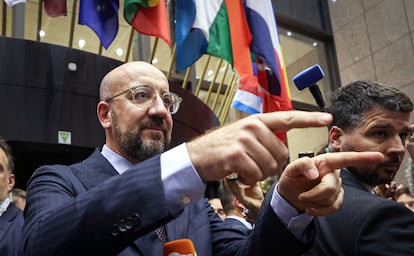Keys to enlarging the European Union: Steps and obstacles on a complex path
Even after the political decision to open accession negotiations with Ukraine and Moldova, these countries still have a long list of moves to make before they can officially join the EU, a process that may well take several years

On Thursday, the European Union member states agreed to open accession negotiations with Ukraine and Moldova, a giant step toward the two countries’ goal of joining the European Union. The EU also promised Bosnia and Herzegovina to open accession negotiations, although that decision — which must be unanimous — will have to wait until at least March of next year to be finalized. As Charles Michel, the President of the European Council, has emphasized, for the countries that are most vulnerable to Russia, the decision by the leaders in Brussels represents a “powerful political signal.” In that vein, Georgia has also been granted candidate status.
However, this decision does not mean immediate entry into the European Union. There are many steps that the countries must take and obstacles they must overcome. Below, we discuss what will happen next, now that the decision to open accession negotiations has been made.
The list of candidates for EU membership increases to nine
The number of candidates for EU membership has just increased to nine, after leaders decided to grant candidate status to Georgia on Thursday in Brussels. It joins a list that includes Serbia, Turkey, North Macedonia, Montenegro, Albania and Bosnia, as well as Ukraine and Moldova.
To reach this point, the applicant must have already fulfilled a whole series of political, economic and “EU democratic values” accession requirements. Attaining candidate status represents an important milestone, as it requires a unanimous decision. However, that does not guarantee that the candidate country will be able to join the European Union. Indeed, Turkey has been considered a candidate country since December 1999. But in this case, Ukraine and Moldovia have progressed in the process at lightning speed, indicating the strongly political nature of the decision. The two countries received candidate status in June 2022, only a few months after submitting their applications for membership on the heels of the Russian invasion of Ukraine.
Opening negotiations is a key step but not a final one
It is not easy for any candidate country to initiate accession negotiations. But even after that has been achieved, candidates cannot yet declare victory: as Turkey is well aware, accession negotiations can take years. In fact, in Ankara’s case, negotiations were officially opened in 2005 but have been in a “deadlock” (the official European wording) since 2018, due to Turkey’s “continuous backsliding” on democracy, rule of law and fundamental rights.
No matter how much of a political signal the EU wants to send — and the current decision is clearly a message of support for Ukraine, as well as a warning to Russia that the EU is not relaxing its support for the aggrieved country and other vulnerable ones — it is still very clear to member countries and candidate countries alike that this is just one more step in a very long process. “It’s not like they are going to join the EU tomorrow,” diplomatic sources agree.
Indeed, Thursday’s agreement to open negotiations is a “political” one, but as the European Commission itself specified in its November recommendations, when the agreement was proposed, Brussels must still verify that the country has fulfilled all the established criteria. In Ukraine’s case, there are seven conditions, of which only four have been completely resolved at this point. Brussels has given Ukraine until March to meet the remaining three criteria, for which there are still a few remaining issues; only then will Ukraine’s accession negotiations start in earnest.
New specifications and requirements
In addition, the European Commission will have to draw up a “negotiating framework” as a basis for the discussions. The actual negotiations can only begin once the member states have agreed to this framework; the EU plans to do this in March at the earliest. The framework must include the 33 mandatory chapters, ranging from guarantees of the rule of law to economic reforms that will ready the country to enter the internal market.
As negotiations continue, the candidate country must prepare to implement all European laws and standards. In each case, all member states must once again decide that the candidate country meets all the requirements. Once the negotiations are completed, the European Commission must give its opinion on whether the country is ready to join the European Union, just as it did before the decision to open accession negotiations. Thereafter, the member states must again decide unanimously to close the negotiation process. The European Parliament’s approval is also required. Only at that point do all member states and the candidate sign and ratify the accession treaty, at which point the country’s membership in the EU becomes official.
Remaining tasks within the EU
Before a new member can be accepted (Croatia was the last member to join a decade ago, although the biggest expansion to date was in 2004, when 10 new members joined), the existing members must also do their homework, which has been reconsidered recently in light of the imminent further enlargement of the bloc: above all, the EU has to decide that it can handle enlargement, an issue that has slowed down the process in recent years.
As decided in October at the informal summit in Granada, Spain, the European Commission will have to prepare a series of proposals — “ideas,” it calls them — for the reforms required for the next major expansion, to be presented in the first half of 2024. The President of the EU Commission, Ursula von der Leyen, has also commissioned a cost-estimate study to be conducted over the next decade. Structures will be modified extensively in terms of budgets, decision-making processes and delicate policies such as agriculture.
Sign up for our weekly newsletter to get more English-language news coverage from EL PAÍS USA Edition
Tu suscripción se está usando en otro dispositivo
¿Quieres añadir otro usuario a tu suscripción?
Si continúas leyendo en este dispositivo, no se podrá leer en el otro.
FlechaTu suscripción se está usando en otro dispositivo y solo puedes acceder a EL PAÍS desde un dispositivo a la vez.
Si quieres compartir tu cuenta, cambia tu suscripción a la modalidad Premium, así podrás añadir otro usuario. Cada uno accederá con su propia cuenta de email, lo que os permitirá personalizar vuestra experiencia en EL PAÍS.
¿Tienes una suscripción de empresa? Accede aquí para contratar más cuentas.
En el caso de no saber quién está usando tu cuenta, te recomendamos cambiar tu contraseña aquí.
Si decides continuar compartiendo tu cuenta, este mensaje se mostrará en tu dispositivo y en el de la otra persona que está usando tu cuenta de forma indefinida, afectando a tu experiencia de lectura. Puedes consultar aquí los términos y condiciones de la suscripción digital.









































